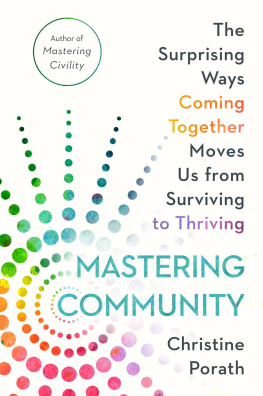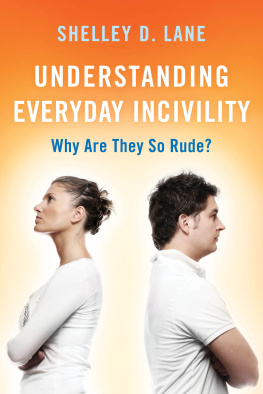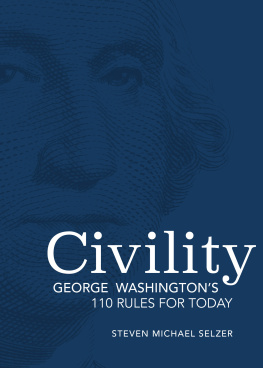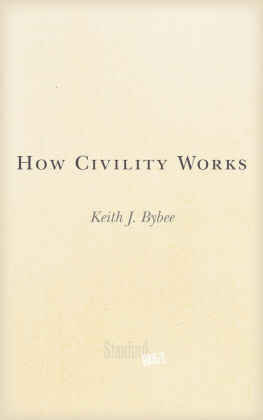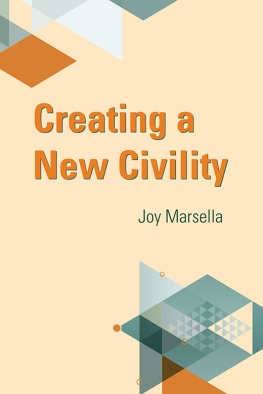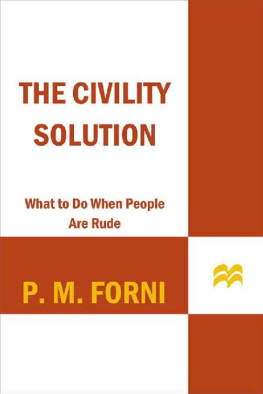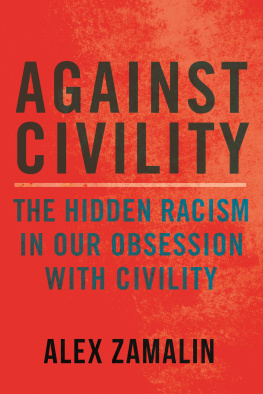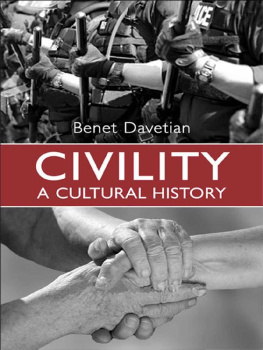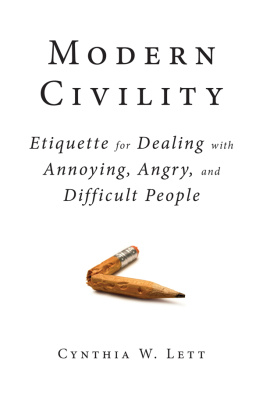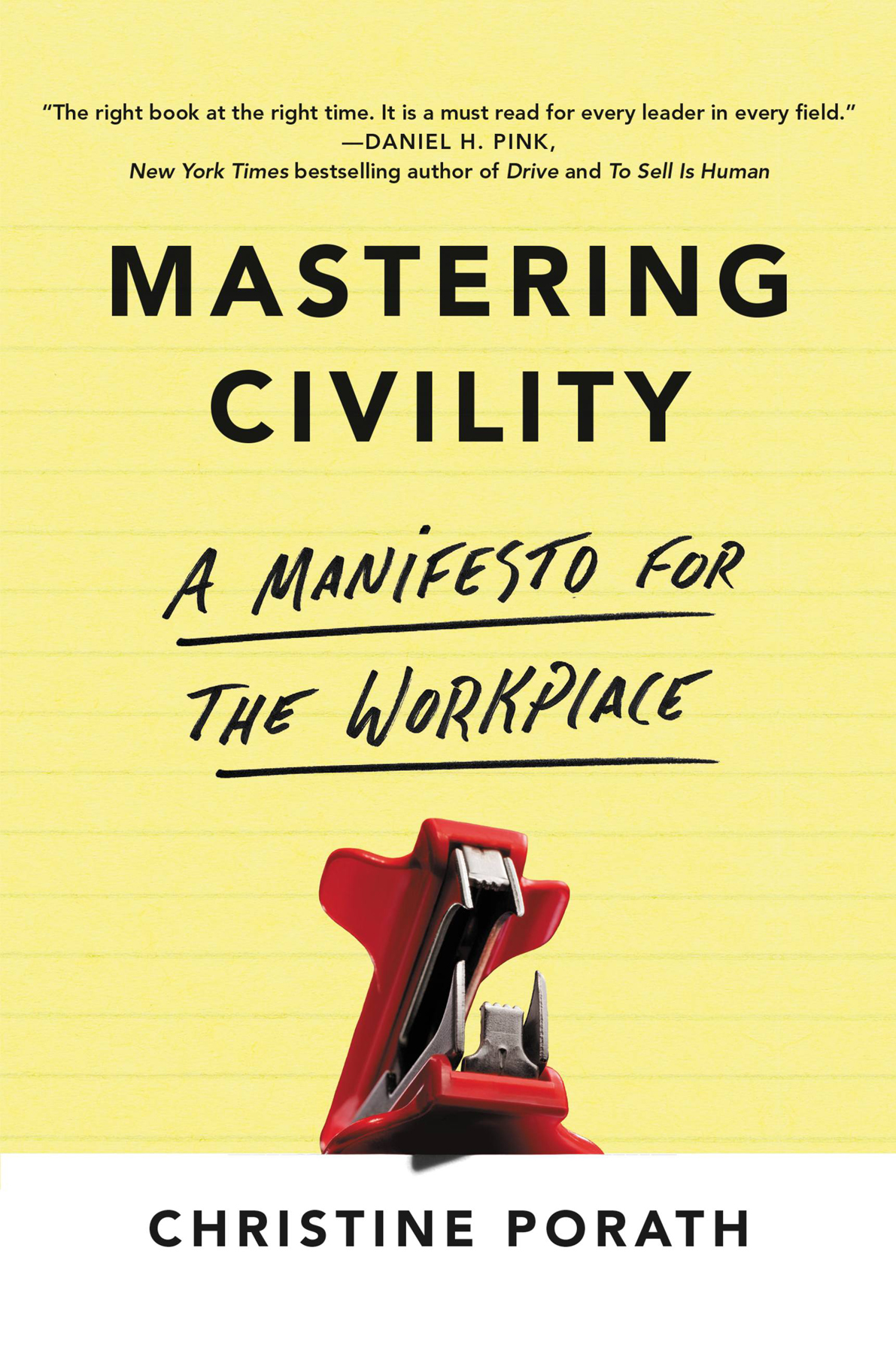Thank you for buying this ebook, published by HachetteDigital.
To receive special offers, bonus content, and news about ourlatest ebooks and apps, sign up for our newsletters.
Sign Up
Or visit us at hachettebookgroup.com/newsletters
Certain names and identifying characteristics have been changed.
Copyright 2016 by Christine Porath
Cover design by Brigid Pearson and Rodrigo Corral
Cover copyright 2016 by Hachette Book Group, Inc.
Hachette Book Group supports the right to free expression and the value of copyright. The purpose of copyright is to encourage writers and artists to produce the creative works that enrich our culture.
The scanning, uploading, and distribution of this book without permission is a theft of the authors intellectual property. If you would like permission to use material from the book (other than for review purposes), please contact permissions@hbgusa.com. Thank you for your support of the authors rights.
Balance
Hachette Book Group
1290 Avenue of the Americas
New York, NY 10104
GCP-Balance.com
twitter.com/grandcentralpub
First Edition: December 2016
Balance is an imprint of Grand Central Publishing. The Balance name and logo is a trademark of Hachette Book Group, Inc.
The publisher is not responsible for websites (or their content) that are not owned by the publisher.
The Hachette Speakers Bureau provides a wide range of authors for speaking events. To find out more, go to www.hachettespeakersbureau.com or call (866) 376-6591.
Thermometer photo created by Mike Porath, illustrated by Valeria Khislavsky
CYCLE TO CIVILITY is a registered trademark owned by Christine Porath.
Whos (Civil) In Your Group? Christine Porath 2015
SERVE Model 2001, CFA Properties, Inc., Chick-fil-A is a registered trademark of CFA Properties, Inc. Used with permission. All Rights Reserved.
Library of Congress Cataloging-in-Publication Data
Names: Porath, Christine Lynne, author.
Title: Mastering civility : a manifesto for the workplace / Christine Porath.
Description: First edition. | New York, NY : Grand Central Publishing, [2016] | Includes bibliographical references and index.
Identifiers: LCCN 2016028809| ISBN 9781455568987 (hardcover) | ISBN 9781478967118 (audio download) | ISBN 9781455568994 (e-book)
Subjects: LCSH: Employee morale. | Courtesy in the workplace. | Interpersonal relations. | Work environment. | Organizational behavior.
Classification: LCC HF5549.5.M6 P67 2016 | DDC 650.1/3dc23 LC record available at https://lccn.loc.gov/2016028809
ISBNs: 978-1-4555-6898-7 (hardcover), 978-1-4789-6711-8 (audiobook downloadable), 978-1-4555-6899-4 (ebook), 978-1-4789-4789-9 (international)
E3-20220607-JV-PC-COR
For Mom and Dad
After delivering a talk at the Department of Labor about overcoming incivility and creating a thriving environment, I stepped into an elevator with some senior executives from the office of the secretary of labor and a few others. One woman standing next to me introduced herself; she had attended my talk and wanted to tell me about an extremely unpleasant problem she was having with an uncivil boss. I listened as she described the situation. She was careful not to name names, but it became increasingly obvious that the uncivil offender was a leader in the organization, someone in the chain between her and the deputy. All other conversation in the elevator had stopped; those around us awkwardly stared off into space or kept their eyes glued to the floor, but they all were listening.
What should I do? this woman asked. Im at wits end. How do I handle this uncivil person I have to work with?
Then, the elevator door opened, and as we all got out, this woman stuck by my side. Stress was eating away at her; I could see it. As we walked down the hallway to the deputys office, I offered some general recommendations, telling her to focus on taking care of herself, that ultimately it wasnt worth being pulled off track by him. I suggested she spend time with people and activities that would inspire or elevate her. This woman nodded, but she was clearly unsatisfied with my advice. Look, she said by way of good-bye as I turned to walk into a meeting, Im totally stuck. I dont want to leave my job; I have so much invested here. I work hard and I want better, not just for me but for everyone. I just dont know how to get it.
I felt this womans pain, because I had been there myself. At the beginning of my career, I scored what I thought was my dream job, helping a global athletic brand launch a sports academy. As I soon discovered, I had walked into an uncivil work culture where bullying, rudeness, and other forms of incivility ran rampant. The actions of a narcissistic, dictatorial boss trickled down through the ranks. Employees felt disconnected and disengaged. Some intentionally sabotaged the organization, stealing supplies and equipment, padding their time cards with hours they hadnt worked and charging personal items to their expense accounts. Many took out their frustrations on others, barking orders at colleagues, making snide remarks to customers, and failing to pitch in like good teammates do. Many talented people left, with some joining competing businesses. I was one of them.
Id like to say the experience left me unscathed, but that wouldnt be true. I was a strong person (or so I thought); after all, I was a two-sport college athlete at a Division I school. My colleagues were resilient as wellnot the type of people who would wilt easily when challenged. Yet many of us were depleted after just a few months of working in a hostile environment. We quickly became husks of our former selves.
After this experience, and watching as my loved ones faced uncivil behaviors over the years, I decided to dedicate my professional life to studying incivility in the workplace and to helping build more positive cultures where people can thrive. Wanting to demonstrate to the world that the way people treat one another at work matters, I set out to show what leaders and organizations lose financially when they allow rudeness to run rampant. I believed there was a moral element to itpeople should treat one another betterbut I also knew that for most organizations, money talks, and I wanted to show that incivility hits bottom lines hard. Given how much time we spend at work, and how closely we connect our identities and happiness to our careers, I thought that we could do betterthat we had to do better. I wanted to show how creating positive, civil workplaces would be good for people, organizations, and society.
Over the past twenty years, Ive researched the experiences of tens of thousands of people across six continents in nearly every industry and type of organization, including start-ups, Fortune 500 giants, nonprofits, and government agencies. Ive consulted with scores of companies around the world of every size and variety. And Ive discovered that one question defines our professional success more than any other. Just one.
Who do you want to be?
Whether you know it or not, youre answering this question every day through your actions. Consider the following scenarios:
Scenario 1
Kate has no energy because she doesnt feel valued. She isnt motivated because she feels like shes set up to fail. Shes frustrated because she wants to succeed, but she feels she cant. Shes nasty to her coworkers because she doesnt feel respected. She gives less because shes being held down.


